All Blacks vs Ireland
-
@Steven-Harris said in All Blacks vs Ireland:
@Chris 💯 shows theres some work going on from the forwards coach which is pleasing to see
Loved how they dictated where Ireland had to throw its bit like setting a trapYep it was really good tactics,then they split the lifter away from the jumper so they couldn’t get any momentum.
-
Gawd Jeff Wilson is a punishing listen on the Breakdown ( i know I am a day late but still..)
-
I dont recall the ref giving any penalties (maybe one but that was williams) for not rolling away, all the rest where for not releasing.
I thought Ratima played really well under the circumstances at the ruck but ne needed to learn how to communicate with ref when there are irishmen just lying about at the back of the ruck impeding his access to the ball. -
Also whats the new ruling about defending a high ball chase? The commentators seemed to suggest its a new tweak but could understand why we got pinged when no one obviously changed their line. Was I just blind?
-
@Mattasaurus said in All Blacks vs Ireland:
Gawd Jeff Wilson is a punishing listen on the Breakdown ( i know I am a day late but still..)
Agree completely, what absolute nonsense from him.
-
I would argue that the biggest area of potential improvement for the ABs, going from the Rugby Championship to the Autumn Internationals, was the defence. While there was plenty of stuff happening in attack, on the defensive side the team gave up plenty of easy scores against their opponents, whether it was through an all-too easily penetrable goal-line defence (South Africa 2), clever set-piece attack from lineout (Australia 1) or complex phase play patterns (Argentina 1).
In Ireland, they had an opponent which could exploit all three areas, so it was a big tick in the box of defence coach Tamati Ellison that the Irish were only limited to 13 points in Dublin. So what changed between the RC and November? Well, it turns out that quite a lot can change in the space of a few months. As an example, I’ve tried to compare the Irish game with the defeat to Argentina in Wellington, as both Ireland and Argentina play with the Leinster blueprint of phase-attack, with Argentina more or less adopting this system after Contepomi has come in. While the defence wasn’t the main reason the ABs lost in Wellington – before the Savea brain explosion in the 68th minute, they were still in an excellent position to win the test – it played a big role in the consistent loss of momentum. In contrast, against Ireland, the defence put consistent pressure on the Irish attack, creating the conditions for McKenzie to kick them to victory in Dublin.
The first thing that stands out when comparing these two games is the AB exit kick strategy. Whereas the ABs kicked long off 9 for their first exit play against Argentina, against Ireland they went with a short contestable kick off 9. Both strategies led to wildly different defensive lines and set-ups at the point where the opposition receivers where able to set up their attack:
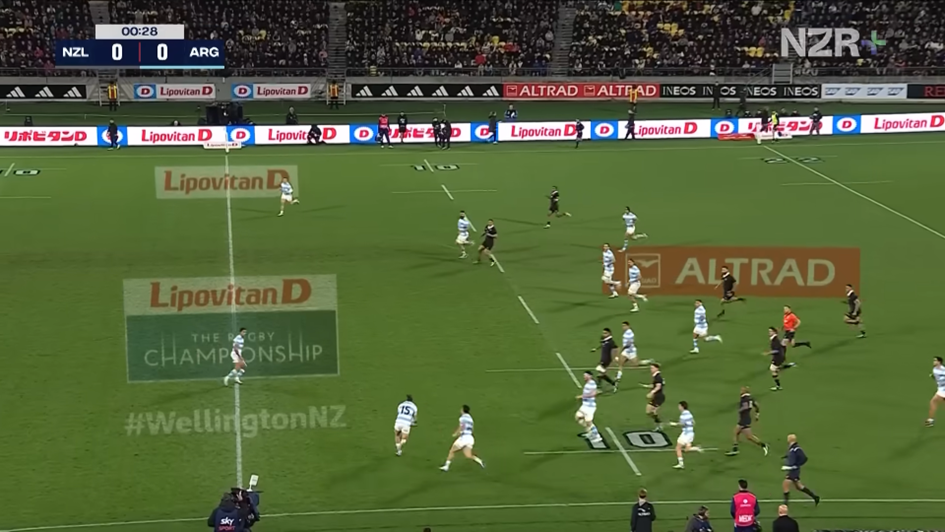
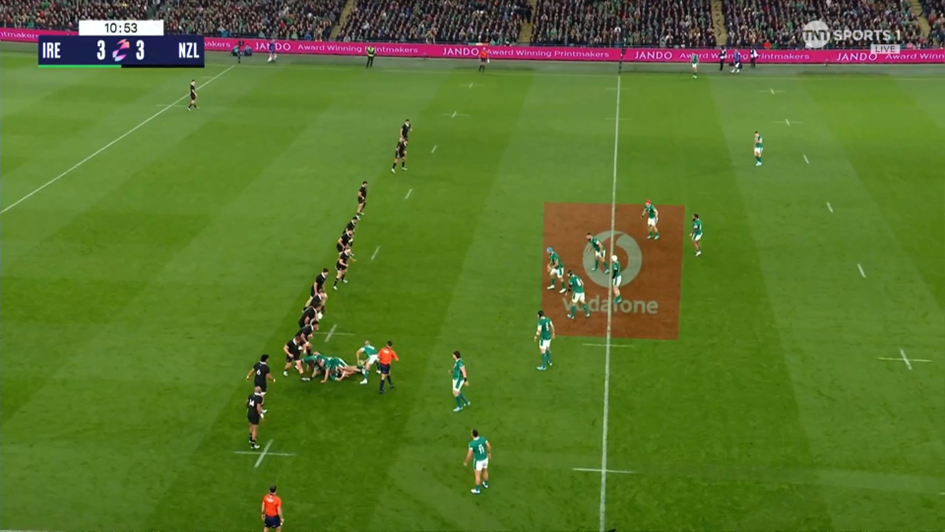
In the first example, Perenara doesn’t look for or fails to find touch going long and the Argentine backfield is immediately able to launch an attack against a very fractured and disorganized Kiwi chase. The Argentinean forwards are positioned well as blockers and in the subsequent phases, the AB defenders are consistently on the back foot, with multiple Argentine switches off 10 able to outflank the AB defence, which isn’t effectively numbering up. After another gain-line carry off Carreras, the Argentine first five is able to get an offload away, with the only thing preventing a certain Argentina try being Beauden Barrett blocking the passing lane for the final pass. Throughout this game, the ABs consistently kicked long without a solid idea behind the defensive purpose of their chase, inviting pressure onto themselves and giving plenty of opportunities for the Argentinean phase attack.
Contrast this to the Irish scenario, where the AB defence is perfectly aligned at the start of the Irish phase attack, as a result of the contestable kick. The Irish try several passes out the back which are well read by the AB defenders, which leaves the Irish attack with little space and few numbers, and a mistake by Aki leads to a positive outcome for the All Black defence. When New Zealand did kick long after the restart, off of McKenzie, they presented a coherent defensive chase (a single hard chaser to put pressure on the opposition kick receiver followed by a set defensive line), making sure they go up together rather than at individual speeds as they did in Wellington.
Back in the Wellington test, time and time again, the New Zealand defence found itself badly outnumbered against the Argentine attack, who have the typical Leinster tendency to overload one side of the field so as to overwhelm the defence with carriers, blockers and backdoor options:
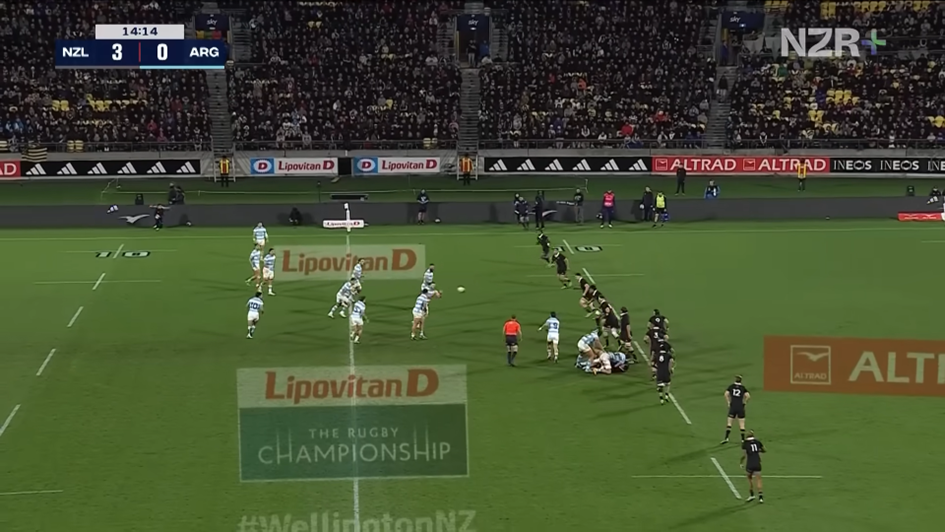
In this particular phase of play, Mallia, the fullback, is allowed to make a line-break and a huge amount of metres, simply because the Argentina numbers are able to fix their opposite defenders, creating options for the attack and doubts for the defence.
In contrast, the Irish were very rarely able to fabricate such scenario’s, as the AB defenders were often effectively able to move into the Irish passing lines. A good example can be found around the 18 minute mark, when Tele’a is stripped off the ball in contact by Beirne, who passes out the back. Normally, this presents an ideal counter-attacking opportunity, only Sititi has immediately sprinted off the line as soon as the turnover happened in order to make this option much more difficult:
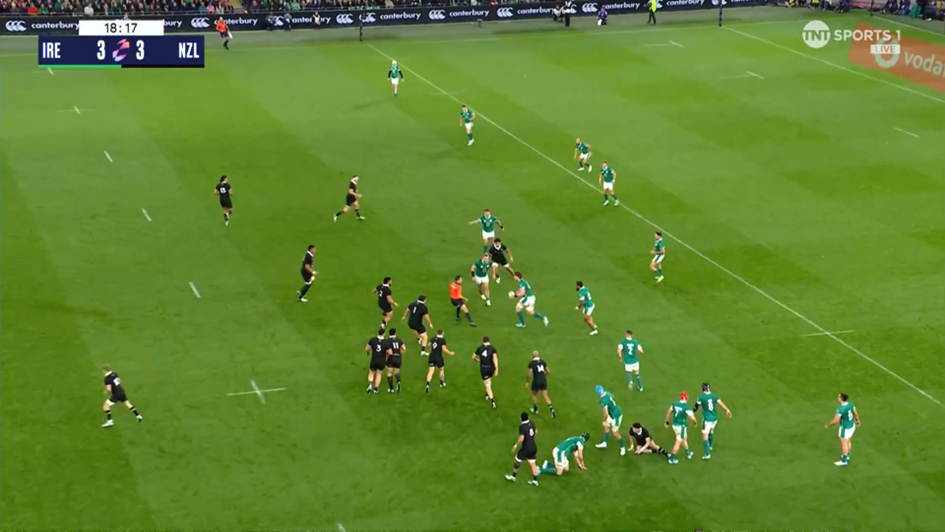
Another example occurred early in the game after the first Irish set-piece attack, with Tele’a simply moving into the passing space of the Irish attack, not so much with the intent of making an early defensive read as spooking the Irish passers and putting doubts into their mind. Again it worked, as Aki hesitates for a moment before throwing a pass that wasn’t on, leading to a Doris knock-on:
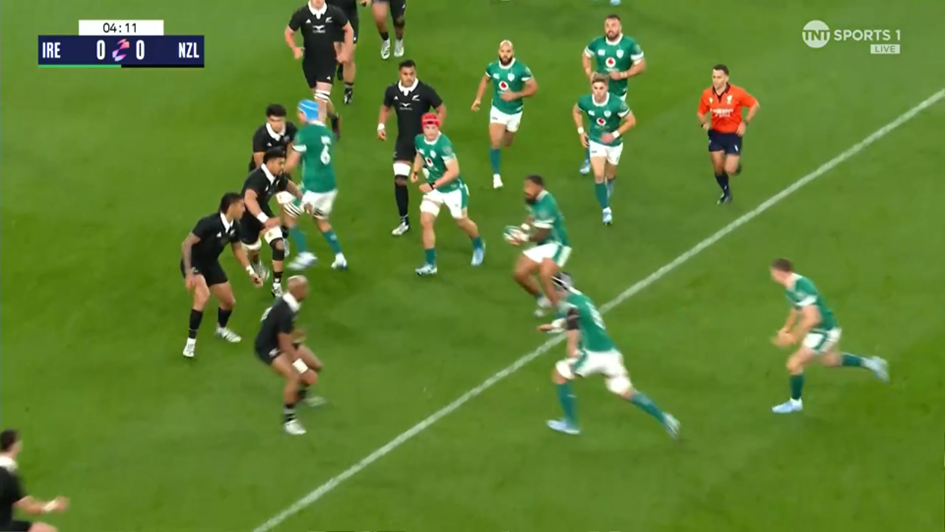
It’s not like the system fundamentally changed between these two tests, as Lienert-Brown also shot up out of the line after turnover ball in the Wellington test for example. The only problem was his execution of the principle. The idea is (1) to get in-between opposition players, and (2) to do this close to where the ball is in order to shut down the movement at its point of origin. Here, Lienert-Brown shoots up (1) into no man’s land instead of getting into the opposition passing space, (2) and, more importantly, far away from the ball:
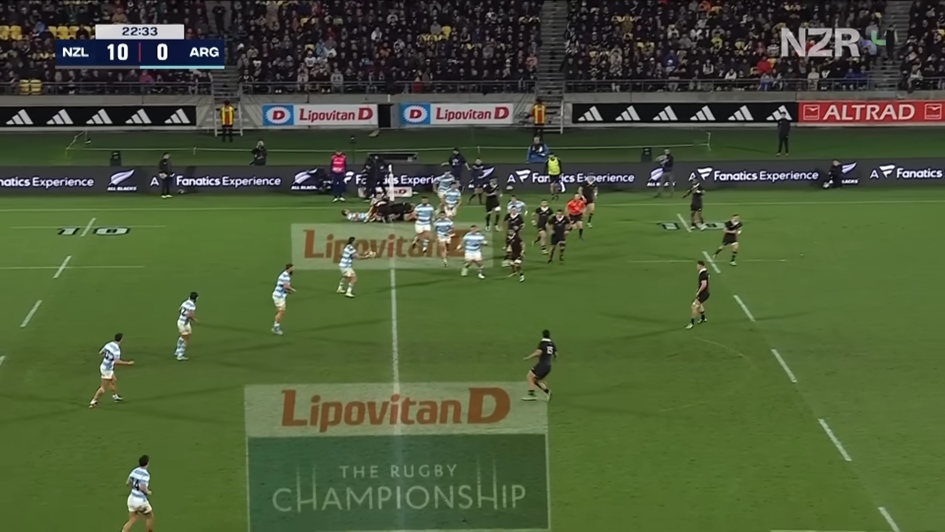
The result is fairly predictable: the Argentineans can use their afforded time and space in order to exploit the non-existent connection between ALB and his inside defender, producing an easy line-break and eventual try to Cinti. If anyone was going to shoot up in-between the Argentina players, it needed to be Savea or Darry close to the ball, in order to shut down the attack before it could get started. Now, the attack was neither impeded, with the added downside of Lienert-Brown opening the door for the Argentina attack.
While the New Zealand defence is by no means the finished product yet, at the very least there are clear signs that both the coaches are getting better at strategically implementing its principles (through kick strategy) and the players are getting better at putting the system into play (by choosing when and where to shoot up, for example). There are more examples of defensive cohesion in the Ireland test – the solid execution of double tackles, the effective pairing of low tacklers and jackal threats, both signs of good defensive communication – but this is already long enough as it is, so I’ll leave it at that.
The French attack will pose a different sort of threat to the Irish (speedy counter-attack, snipes off 9, overloading the spaces around the ruck with big carriers), so it will be intriguing to see whether Ellison is able to prep his defence accordingly. If he does, important steps will have been taken by this coaching team towards both an improved attack and defence.
-
@Mauss Maybe the Fern isn't for you? We're more about "Player-X is shit!" "No he's not, Player-Y from your region is shit!" "You're both stupid, Player-Z is the shizzle-for-rizzle, and will be an AB GOAT!"
Sharpen up mate. Less analysis, more kneejerk reactions. -
@Mauss said in All Blacks vs Ireland:
@Kruse said in All Blacks vs Ireland:
Hurricanes fan
Now hold on a minute, let's not start saying things we can't take back.
Fair enough - sorry, that was too far. Banning offence.
-
@Mauss said in All Blacks vs Ireland:
@nzzp Cheers. Always loved reading the Fern, it's nice to contribute a bit in my own way.
If you really want to fit in around here, make sure you remember the Fern motto. You're really breaking a few rules at the moment.
Awful analysis, incorrect conclusions, zero insight
Wrong about pretty much everything
-
Having just read the last 500 posts it is very interesting the way the consensus went from "Robertson is shit, we have lost this, we are brainless, the world is fucked" at around the 50-minute mark to "best defensive effort in forever, selectors really getting it right, played smart rugby, possible era defining victory, bring it on world". 😂
I was pleasantly surprised by the performance on a number of levels, but Ireland looked bloody poor and rusty as fuck. Need to perform consistently and against good sides - both England and Ireland have looked below par - before I'm going to get too lathered up.
-
To be fair though we also maybe didn't let them play well - as Mauss has written.
-
Am happy to see Cane link more often , he's not a consistently effective carrier with his low level of speed (something he had in his first test). And good to see Tele'a getting some speed back, I think he had an injury, not just a positional change.